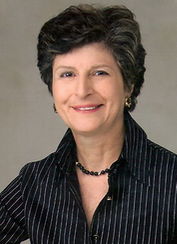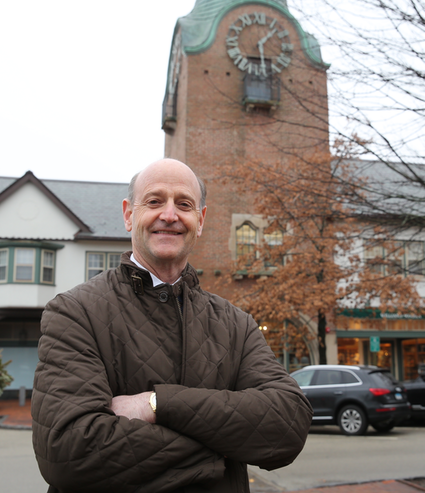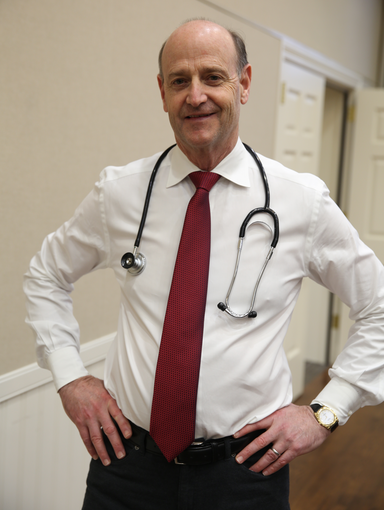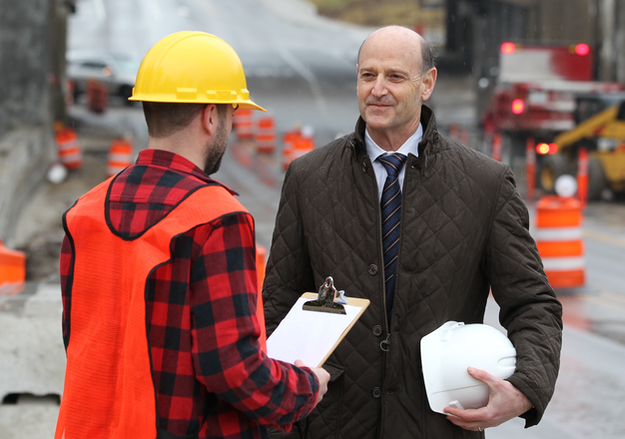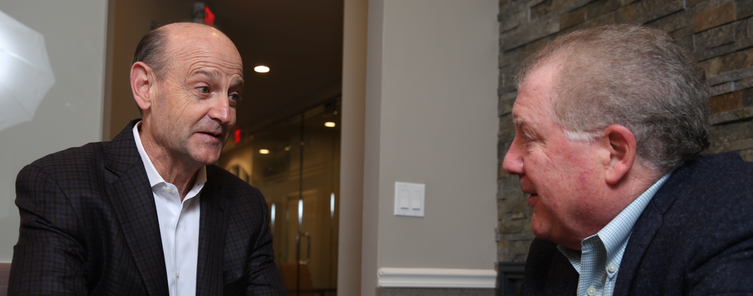An Interview with Randy
When Randy Tack was in high school, his father, a mechanical engineer, was asked to run for alderman in Glen Ellyn.
"His motto for dealing with issues on the council was, 'Change isn't always progress,'" recalls Tack, a former 3rd Ward Alderman and Lake Forest Caucus-endorsed candidate for Mayor. "Then as now, there's pressure for development. But, development isn't always progress. Development has to be managed so you don't change things worth preserving."
That motto has been an impetus in Tack's eleven-year involvement in Lake Forest government, something to which he never aspired, he says.
In 2011, a neighbor asked him to interview for alderman. "I was really honored because it was really out-of-the-blue," Tack recalls. "I had no exposure to any board or commission. I never expected I would be selected on the first round."
Ann Therese Palmer
Recently Ann Therese Palmer, a Lake Forester and retired Chicago Tribune columnist, interviewed Tack, 64, about his life and experiences as a Lake Forest alderman, committee chairman, and Caucus-endorsed mayoral candidate. Palmer, a non-practicing attorney and a prize-winning retired business reporter, who wrote for The Chicago Tribune Business Section and BusinessWeek Magazine, has lived in Lake Forest for thirty-four years.
Tell me about your early life, college and med school experiences.
My dad was a mechanical engineer for a company in Cicero. When I was in junior high, my mom returned to work as a diabetes education nurse. I also have a sister, a high school economics teacher.
My dad and grandfather were mechanical engineers. I grew up in a mechanical household learning to fix things. That's why I decided to specialize in orthopedic surgery in med school. It's all about reconstructing things, which has fascinated me, since I was young.
In high school, my biology teacher pushed me to take the Biology AP Test, not taken by many students at that time. I agreed and got a 5, the highest score. That spurred me to major in biology in college.
During my junior year, I still liked biology, but had no idea how to build on that interest for a career. I decided to take the Medical School Admission Test. Unfortunately the next test was at the beginning of my senior year. I scored in the 99th percentile.
Because I'd taken the test so late, I couldn't enter medical school until a year after I'd graduated. In that year, I worked as a bar tender and worked in a factory as a steelworker. The earnings from those jobs completely paid for my medical school tuition. I also had no housing expenses because I managed an apartment building -- mowing lawns, vaccuming carpeting, taking out garbage -- and had an on-site apartment. So, I graduated with no student debt.
What attracted you to move to Lake Forest?
Randy in Market Square
My first wife, Liisa Merits, a Lake Forester, was one of my med school classmates. In 1990, we moved to a small house in Lake Bluff to be near Lisa's parents, who lived in Lake Forest and had offered to help care for our children. At the same time, Lake Forest Orthopedics, a prestigious practice and the Bears' team physicians, offered me a plum job.
My first experience in city government was when I was recruited to run for the Lake Bluff Elementary School Board; but, lost in a run-off. In 1993, we moved to a home on Western Avenue in Lake Forest where I still live with my second wife, Paula. My backyard is in the 2nd Ward.
As a new resident, Lake Forest was like finding myself in paradise. Lake Forest had great schools and amazing open spaces. It had recently finished the beach development. As a young man, I couldn't imagine living in a better place.
In 2004, Lisa died from glioblastoma, cancer of the brain and spinal chord. You became a single parent, raising two teenagers, who attended Lake Forest High School. How did our community help you? Is that a motivation for wanting to give back to the community?
My mother and father-in-law and I, by ourselves, cared for my wife at home 24 hours a day for about six months. I reduced my work to part-time. My son, a junior, was applying to colleges. My daughter, a freshman, was in a professional ballet training program downtown which she attended daily.
I had to negotiate with the high school about my daughter's schedule because her ballet training precluded a regular school day. Friends would bring dinner, run errands and were very supportive to me and my family. When I was asked to run for 3rd Ward Alderman, even though I was busy at work, I wanted to give back to this community that had done so much for my family and me.
What did you enjoy about representing the 3rd Ward as alderman?
Dr. Stanford “Randy” Tack
I loved being alderman because you're really involved in the community, doing meaningful things. It focuses my critical thinking, problem-solving skills on issues I don't encounter at work. The initiatives I've started, like the water filtration plant and elimination of the special service area tax, have resulted in meaningful, positive results.
Four years ago, the Caucus asked me to interview for mayor. I went through the interview process and wasn't picked. George Pandeleon was selected. He had the skills set the City needed at that time. Then, they asked me again last year.
Shortly after you started at Lake Forest Orthopedics, the doctors decided to join two other practices to form a corporation. They elected you to manage the Lake Forest practice. So, in addition to your patient work, you were also now managing an unusual small business. What did you learn from that experience that's helped you in your work as chair of the Central Business District Planning Committee?
I dealt with the highly-educated, successful partners in our group plus professional human resources -- hiring and firing physicians. In addition, I set our compensation, purchased malpractice insurance, ran meetings and made decisions on how to best use our resources for leasing and buying equipment.
My work as Chair of the Lake Forest Central Business District is very similar. Our Committee is working with a group of successful individuals, each with strong opinions about what the CBD should be. My goal is to bring individuals together to ensure the final results of our decisions fairly reflect the group, not individuals.
Randy and Mary enjoying a chat
Specifically we're looking at what development is likely to occur over the next ten years, where it will occur and what policies can be put in place to ensure the development will have a net positive effect on the character and vitality of the Central Business District. Issues include improved walkability, parking, water storage and retention, streetscapes. To date, we've had a consultant give two talks at Gorton. These were open to all residents. We've sent requests to everyone in the city to weigh in. We've been open and above board. There are no specific plans under consideration at this time.
Because I'm running for mayor, some people are contending this committee will reflect my personal interests. Nothing could be further from the truth. I talk the least. As chair, my job is to focus the information and opinions of the group members to achieve a successful outcome. In this case, it's a clear, concise document that sets up a pathway for development in our city that reflects varied perspectives. It's not about getting committee members to agree with me. It's about getting them to agree on a document that reflects all opinions.
What was involved in you spearheading the elimination of the Special Service Tax? What's been the impact on residents?
When Jack Preschlack was mayor, Lake Forest experienced a period of rapid development, which included new multi-unit housing. City Council was concerned this housing would bring an unusual influx of children into the school district. Under Illinois state law, communities can levy a tax on a part of its population, if that group poses a special financial burden on the city. So, the City Council created a special services district encompassing this multi-unit housing unit whose developers and subsequent homeowners would pay $400-600 annually for twenty years.
A unit owner came to me and said it was unfair. His building's occupants were empty-nesters with no children. He asked me to investigate. I agreed it was grossly unfair. Eventually five aldermen joined me to eliminate the tax. Over a ten-year period, it saved those residents nearly $800,000.
My opponent accuses me of not being able to work with people. I started this project by myself, as a result of a constituent complaint. I had to lobby each alderman one-by-one that this was the right thing to do. If this isn't being collegial and working with other people, I don't know what is.
You've also chaired two committees, Fire Vision and Public Works, whose recommendations have impacted significantly the city's revenues and future income. Would you please explain what each committee recommended and how adoption of those recommendations have benefited Lake Forest residents?
The Fire Vision committee examined what would be required in the future for Lake Forest to provide fire protection services, since we have our own fire department. We looked at revenues, expenses, equipment, what the firefighters actually did, alternative models of providing services. We talked to union representatives, consultants, management teams. These were difficult, sensitive meetings. The biggest threat to providing fire protection, we realized, was our pension obligations. If nothing was done, by 2025, 100% of the city's discretionary funds would be needed to fund pensions because of the pension logarithmic curve. We would have no financial cushion for an emergency. We did some research and learned if we started pre-paying from our funds reserve, we could flatten the curve. The City Council agreed with the Committee's recommendation to add a $15 tax to each quarterly water bill for six years. As a result, our pension obligations are flattening, not increasing.
Randy working with City Staff
With Public Works, we had an issue with inconsistency of water revenues. Unlike other municipalities, we sell our residents water. When summers are dry, we make a lot of money; but, when it's rainy, we make very little. We depend on that money to support other city activities. We needed a way to make the revenues more predictable and consistent. After much study, we recommended to City Council adoption of a fixed water structure fee. Each resident pays for the fixed costs of providing water. This was providential because shortly after we made this decision, we learned the French supplier of our water filtration plant filters couldn't supply us much longer. That necessitated rebuilding the filtration plant, a $12 million expense, to accommodate a different type of filter.
Your opponent characterizes you as someone who doesn't listen. What's your response?
If I hadn't listened to my partners and been collaborative, would they have annually re-elected me to be their managing partner for ten years? I had arguments with all of them all of the time. My job was to bring them all together for a successful outcome for the organization.
Listening doesn't mean accepting everybody's arguments and automatically adopting their positions.
Here's an example from the recent rail proposal. A group of residents wanted City Council to create a several hundred thousand dollar fund to fight the rail proposal. We listened to their arguments and agreed with them. But, because there was no actual proposal to build and all rail rights are controlled by the federal government, we had no standing to launch a costly fight with lawyers and consultants. That's an example of listening to what people want; but, not making the decision they want because the facts don't support it.
Listening is a significant part of my surgical practice. On a typical day, 30-40 people come to me with health complaints. I sit, listen to them, and make a diagnosis. In the last thirty-two years, I've had over 400,000 patient interactions. To say that I don't listen is preposterous.
Lake Forest government is run by a professional city manager, with the City Council and Boards giving input from the residents and making long-term policy. The mayor has no vote except to break a tie. Given this, what qualities are important for a Lake Forest Mayor to have? Why do you think you're best qualified for the job?
First and foremost, it's the mayor's job to implement the City Council's decisions, even if the mayor doesn't agree. That means, if it's an unpopular decision, the mayor takes the heat.
Randy and Mayor George Pandaleon
The mayor is the management intermediary between volunteers and professionals to make sure both groups are working in the city's interests and performing at expected levels.
The key word is trust. The mayor has to have and develop the trust of the city manager and staff plus board and commission members, as well as the city council, which I have. All of these people have to trust the mayor respects them and will empower them to do their work to their best ability. They have to trust, when they're in difficult situations, they can depend on the mayor to be their teammate and not blame them for unpopular decisions.
I'm the best qualified because I have a proven track record -- both in business management and in city government -- of successfully tackling complicated issues and achieving consensus for workable solutions. My entire professional life has been based on problem-solving, critical thinking and decision-making for which I've had to take responsibility. Those are the same attributes you expect a Lake Forest Mayor to have.
Your opponent has characterized you as representing "special interests." Do you have any idea what she's talking about?
No. She's implying that I'm an insider with the Caucus. My only association with the Caucus is it keeps selecting me to do things. I've never been elected as a Caucus Ward Representative. I didn't know any of the people on the nominating committee which selected me.
I have no special interests. I have no relationships with any developers.
That's one of the most baffling things about this campaign. To say I'm representing a developer's interest is ridiculous.
If elected, is this the last political office you plan to seek?
Yes. I have no interest in political office. I do not consider being mayor of Lake Forest a political office. We have volunteer government. For me, this isn't about politics. It's about volunteering to do a job for the city.


